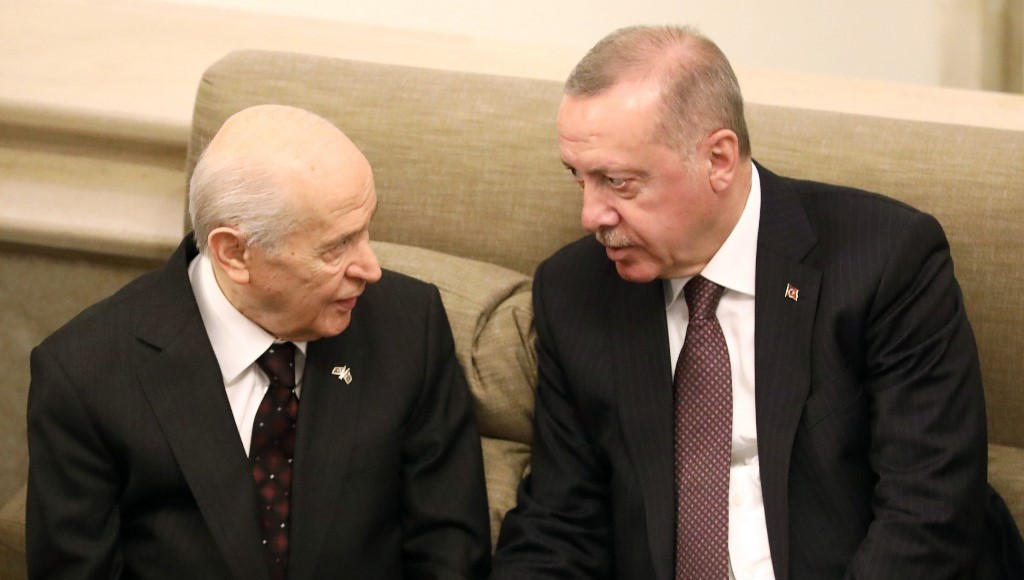Some call him Turkey’s ultranationalist kingmaker, others see him pulling the strings of the state’s security policy.
Yet for a man whose far-right Nationalist Movement Party (MHP) won only 11 percent in a 2018 election, Devlet Bahçeli’s influence over the government stretches far wider than his vote share.
Now, with support for President Recep Tayyip Erdoğan’s Justice and Development Party (AKP) slipping, the Turkish leader may need Bahçeli’s MHP more than ever to extend his rule into a third decade.
Balding, diminutive and craggy-voiced, the 73-year-old Bahçeli cuts a mysterious figure despite leading the MHP since 1997.
Critics say Erdoğan does Bahçeli’s bidding in return for votes that guarantee the government a parliamentary majority, steering Turkish policy ever further to the right.
When the coronavirus became a grave issue last year, Bahçeli secured the release of a mafia boss he knew as part of an early release amnesty for prisoners.
“In the past three years, Mr Bahçeli’s attitude and behavior have set the AKP’s political course,” said İdris Şahin, a former AKP member who is now the deputy chair of the opposition DEVA Party.
“So despite having little representation in government, the MHP’s influence is just as big as that of the AKP,” Şahin told AFP.
Security policy influence
The MHP has no government ministers, although the nationalist-leaning Interior Minister Suleyman Soylu is a party favorite.
When Soylu tried to resign last year because of his handling of Turkey’s first coronavirus lockdown, Bahçeli and the MHP rallied to his defense.
Erdoğan rejected the resignation, and the interior minister is now politically stronger than ever.
Bahçeli’s influence was again on show after a top court’s chief prosecutor filed a case last month to shut down the country’s main pro-Kurdish party.
He had led the closure calls, and the case was announced the day before an MHP party congress, viewed by critics as Erdoğan’s “gift” to his partner.
The MHP acts as Turkey’s “national security council”, associate professor Burak Bilgehan Özpek said, referring to a once-powerful body filled with military figures.
“The MHP draws the national security policy framework,” Özpek said, adding that Bahçeli can decide whom to designate as terrorists in Turkey.
When a leading AKP figure objected to banning parties in December, Bahçeli countered that the issue was about “punishing treason.”
“It’s important for Bahçeli that the AKP acts in line with the national security framework,” Özpek told AFP.
‘A necessity’
Yet the AKP, which is rooted in political Islam, and the MHP come from different backgrounds and Bahçeli has not always gotten his way.
He was a supporter of an oath students recited in school, which included the nationalist line: “I’m Turkish. I’m right.”
The AKP ordered its removal from schools in 2013, a decision a top administrative court approved in March.
The MHP’s “People’s Alliance” with the AKP only happened after Bahçeli had at first opposed Turkey’s transformation from a parliamentary republic into an executive presidency.
But he changed his mind after a failed overthrow of Erdoğan in July 2016. The shift was approved by the public in a referendum and came into force in July 2018.
“For our country’s survival, the People’s Alliance became a necessity,” said MHP lawmaker Ayşe Sibel Ersoy.
“That is how the MHP and the AKP came together,” Ersoy told AFP.
The MHP’s backing for the new system opened the door for their ultranationalist supporters to enter the state bureaucracy, according to academic Berk Esen.
“Under the presidential system, the MHP has increased its importance, there’s no question about that,” the assistant professor at Sabancı University said.
Erdoğan restricted?
There is still some disagreement between analysts and Western diplomats over the extent to which Bahçeli actually controls Erdoğan.
“Erdoğan has to keep the alliance going but the president is constricted by Bahçeli,” said a Western diplomat.
After discarding previous allies, including Western-leaning liberals, Erdoğan is left with the ultranationalists.
But Esen said Erdoğan still had “the upper hand” over Bahçeli.
“I don’t think Erdoğan has been led astray and is forced to take steps that he doesn’t really want to,” Esen said.
Another Western diplomat described Bahçeli as a kingmaker, a description Özpek of TOBB University disagreed with.
“Turkish politics’ kingmaker is Erdoğan. Bahçeli plays this role because Erdoğan allows him,” he told AFP.
“Bahçeli can speak as if he is the national security council because Erdoğan benefits from this. Erdoğan doesn’t want to stop him.”
AFP



